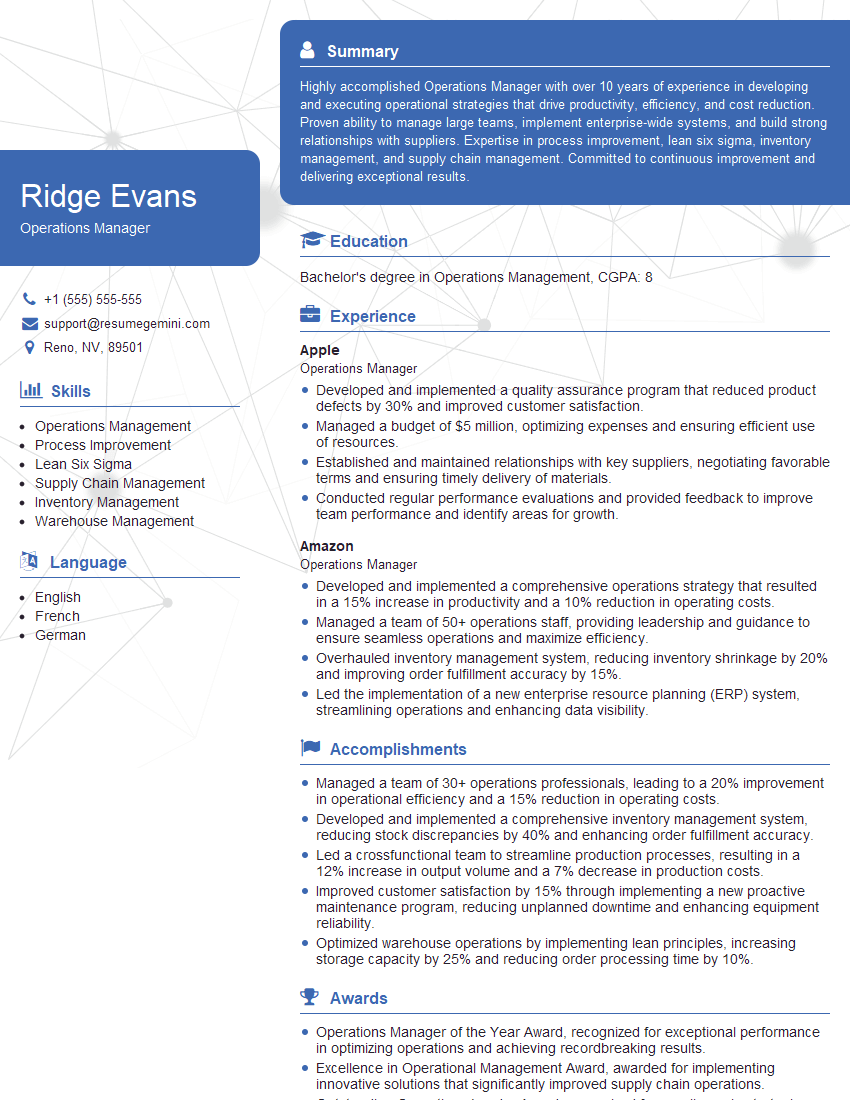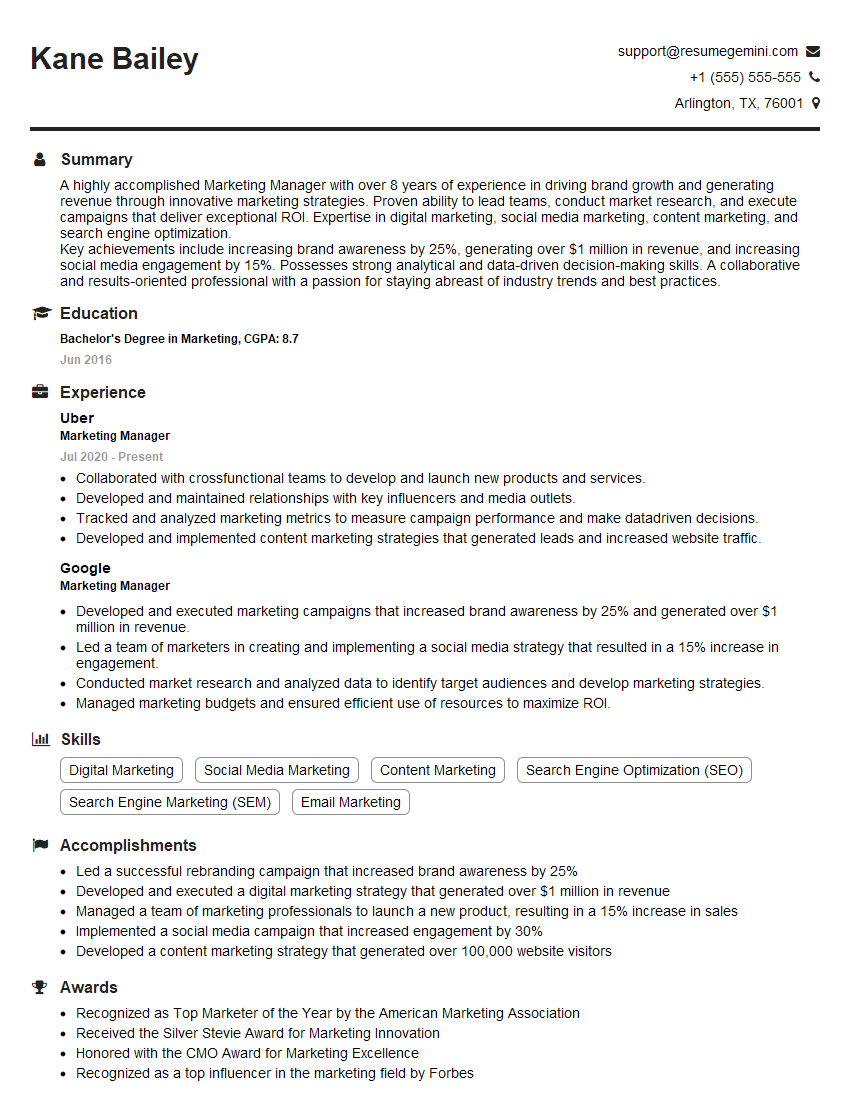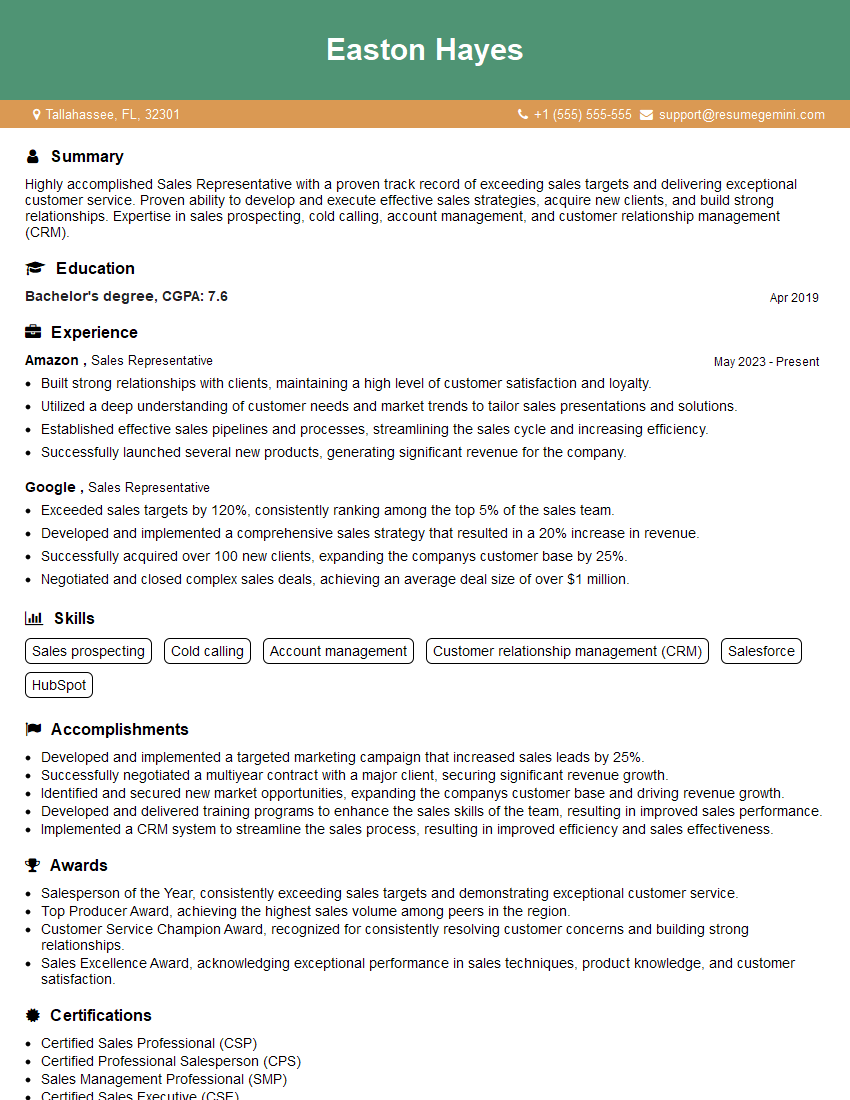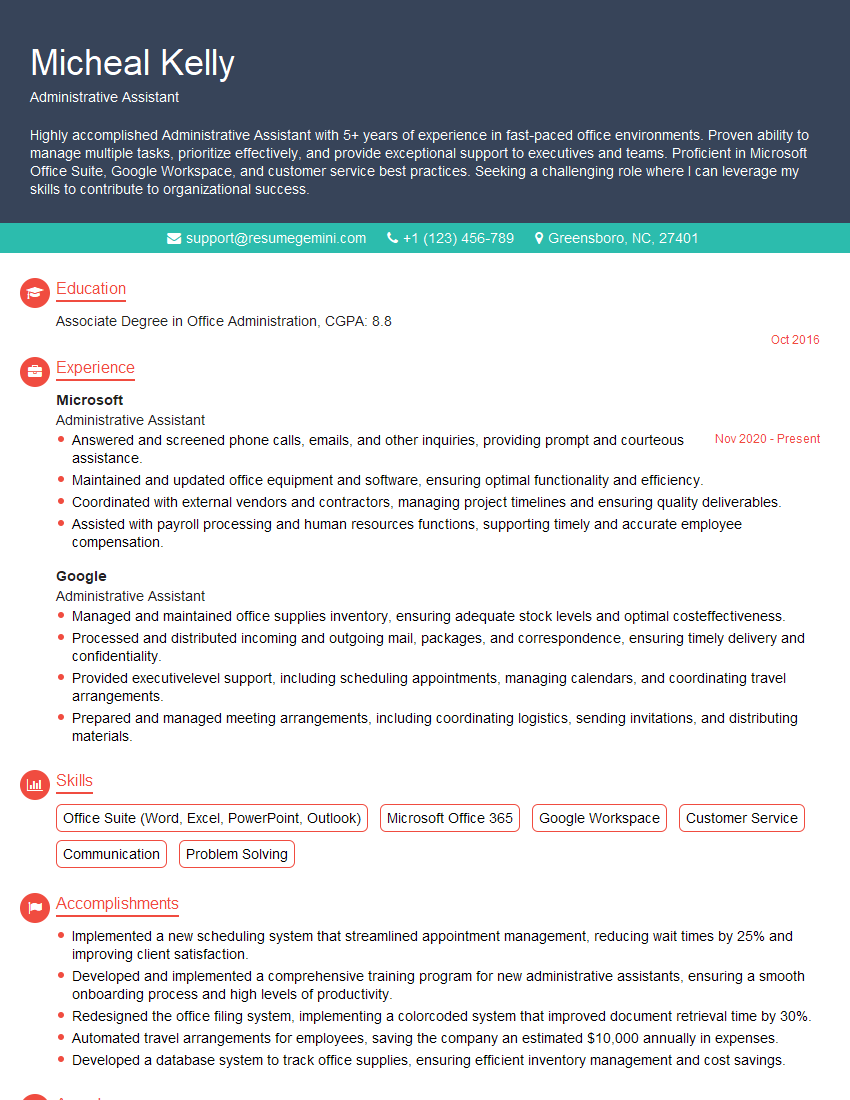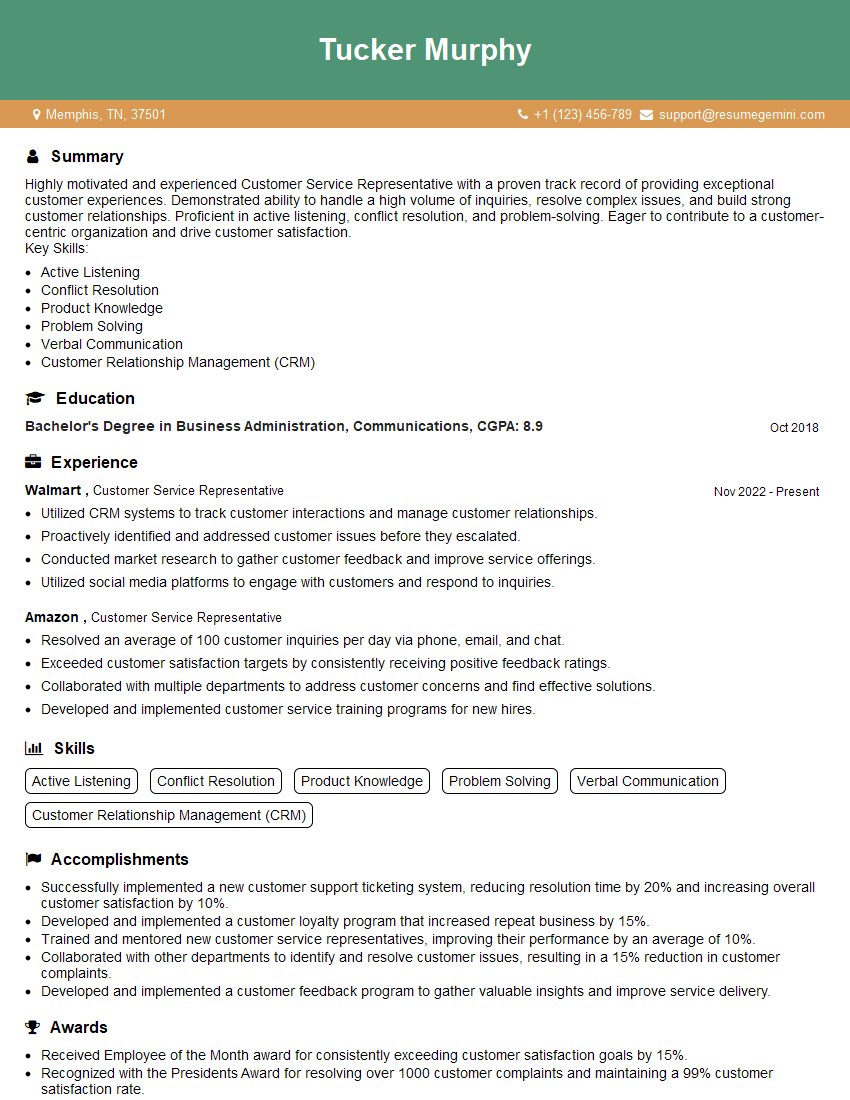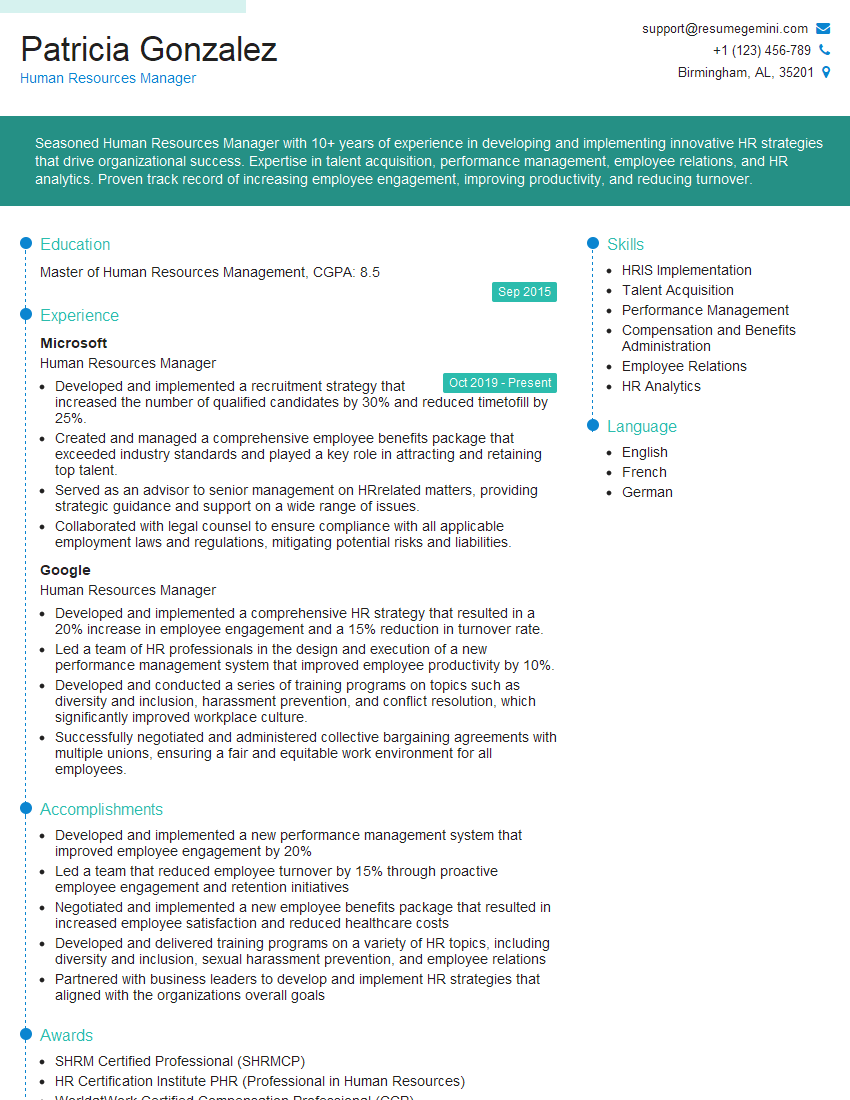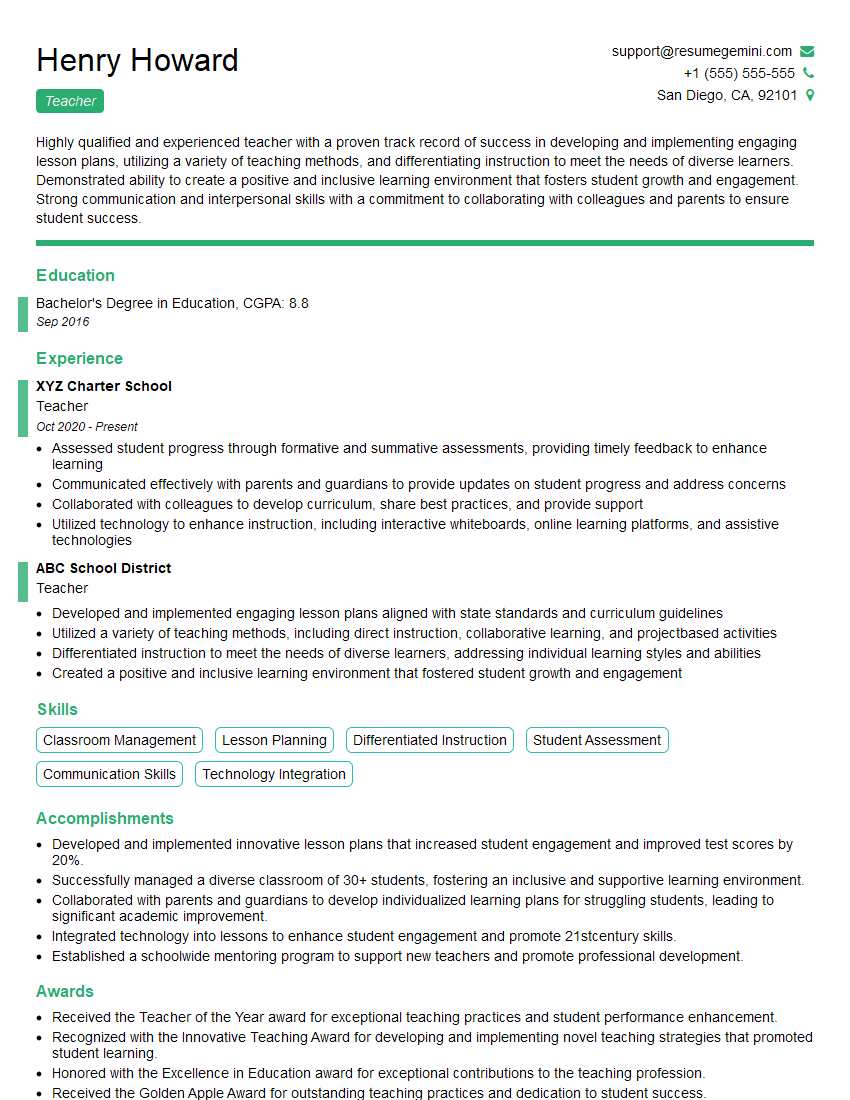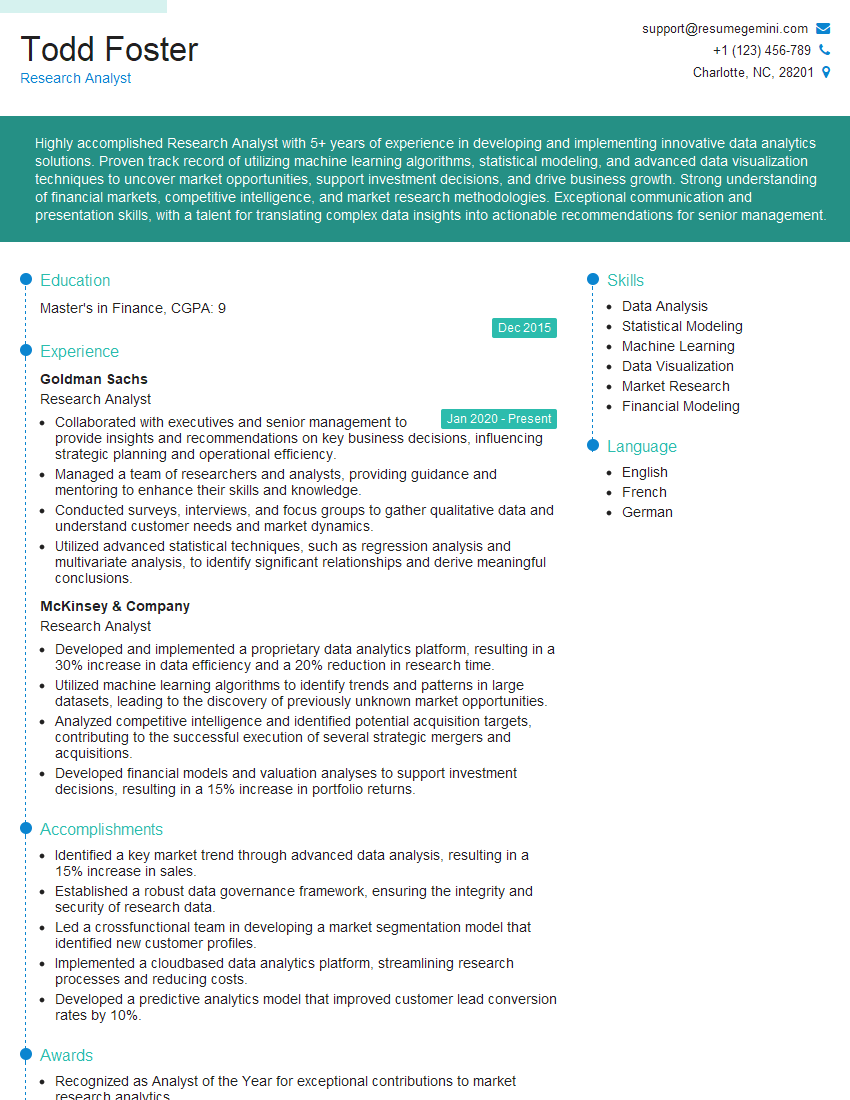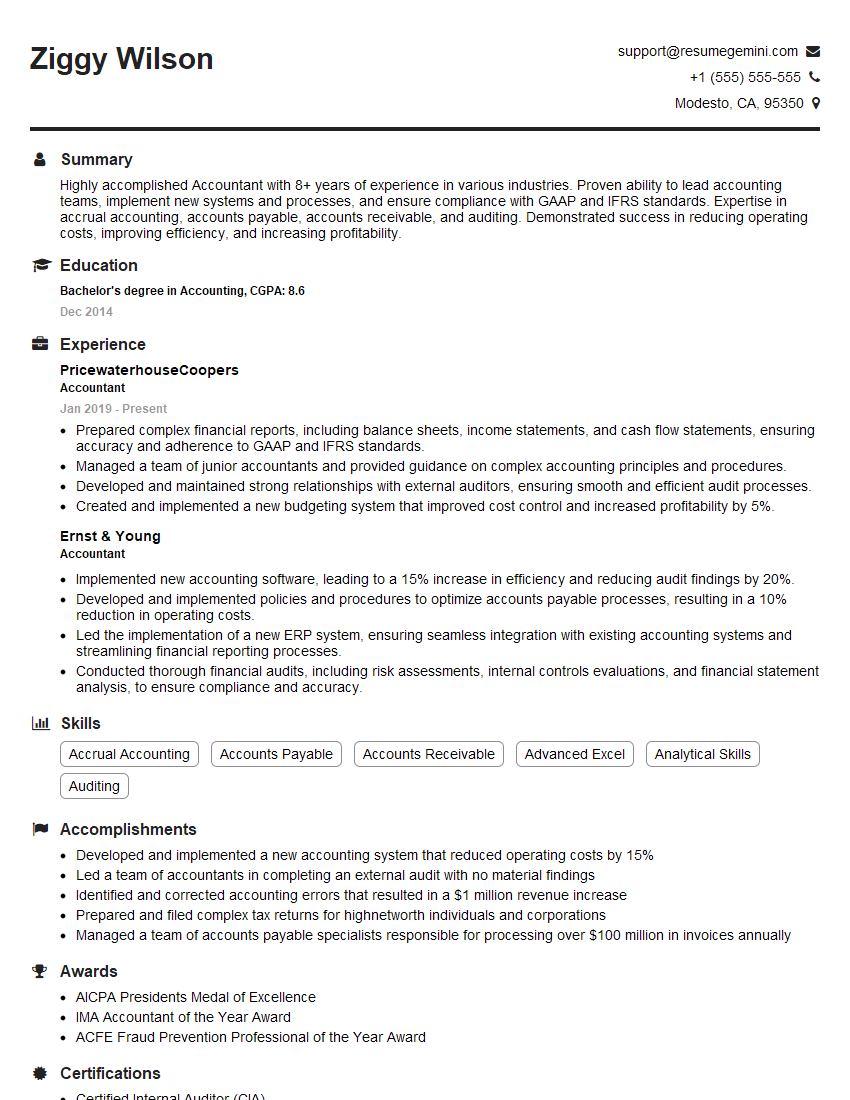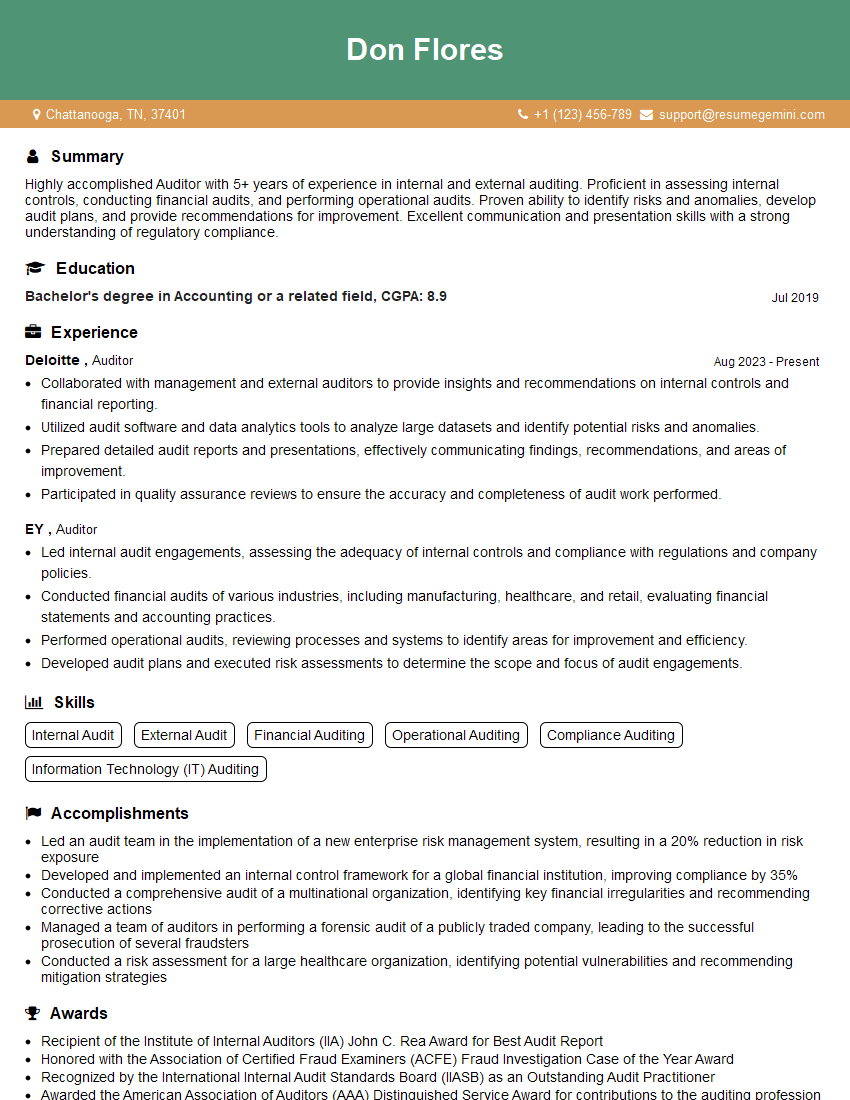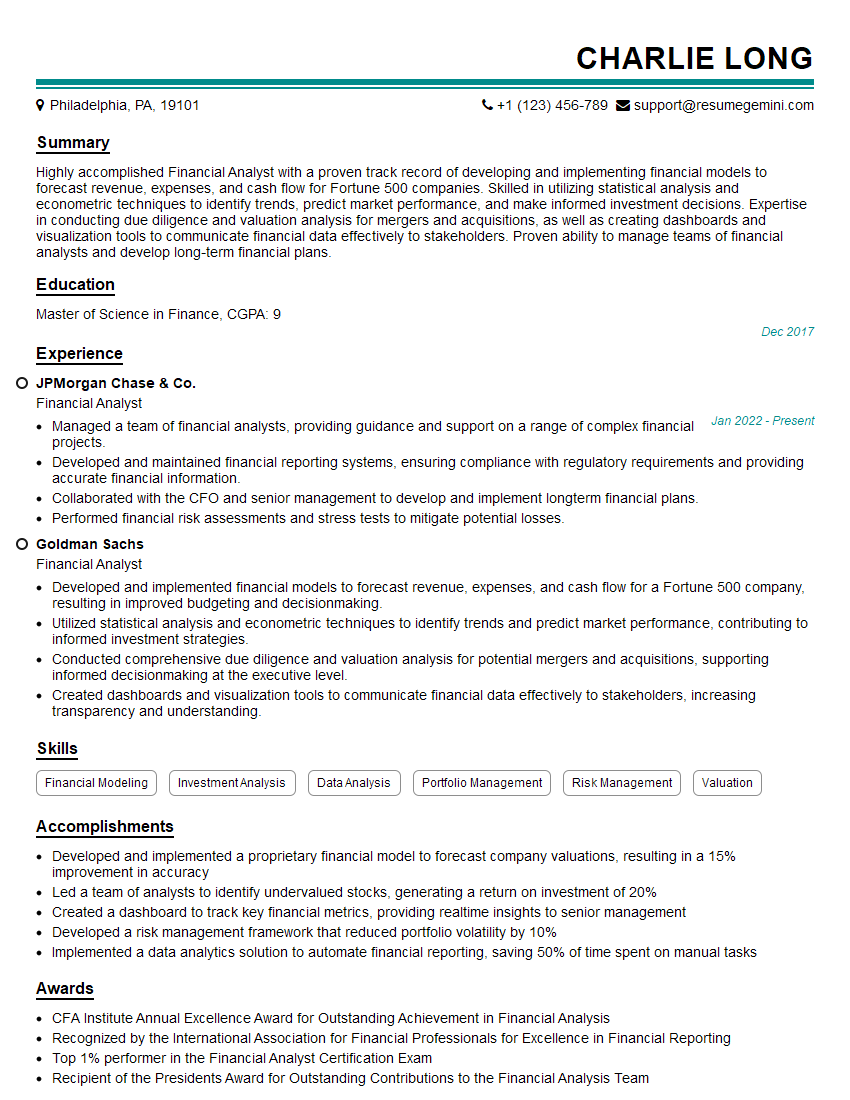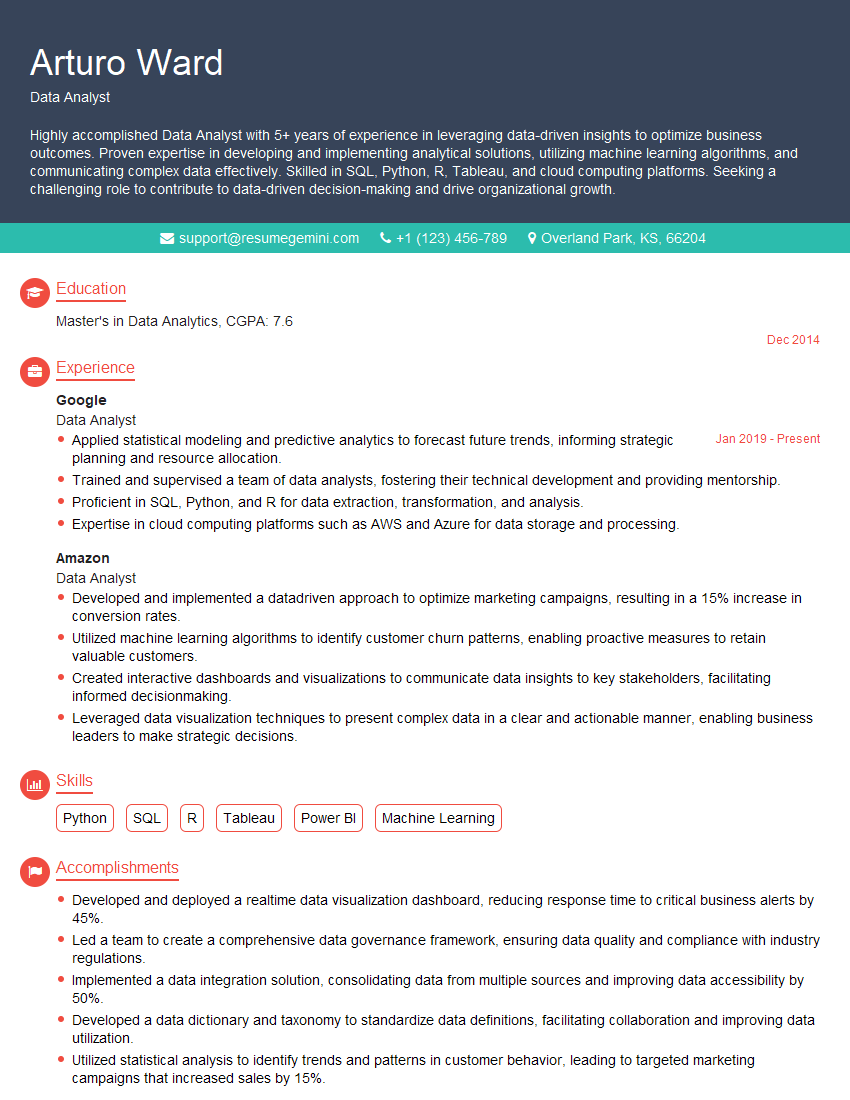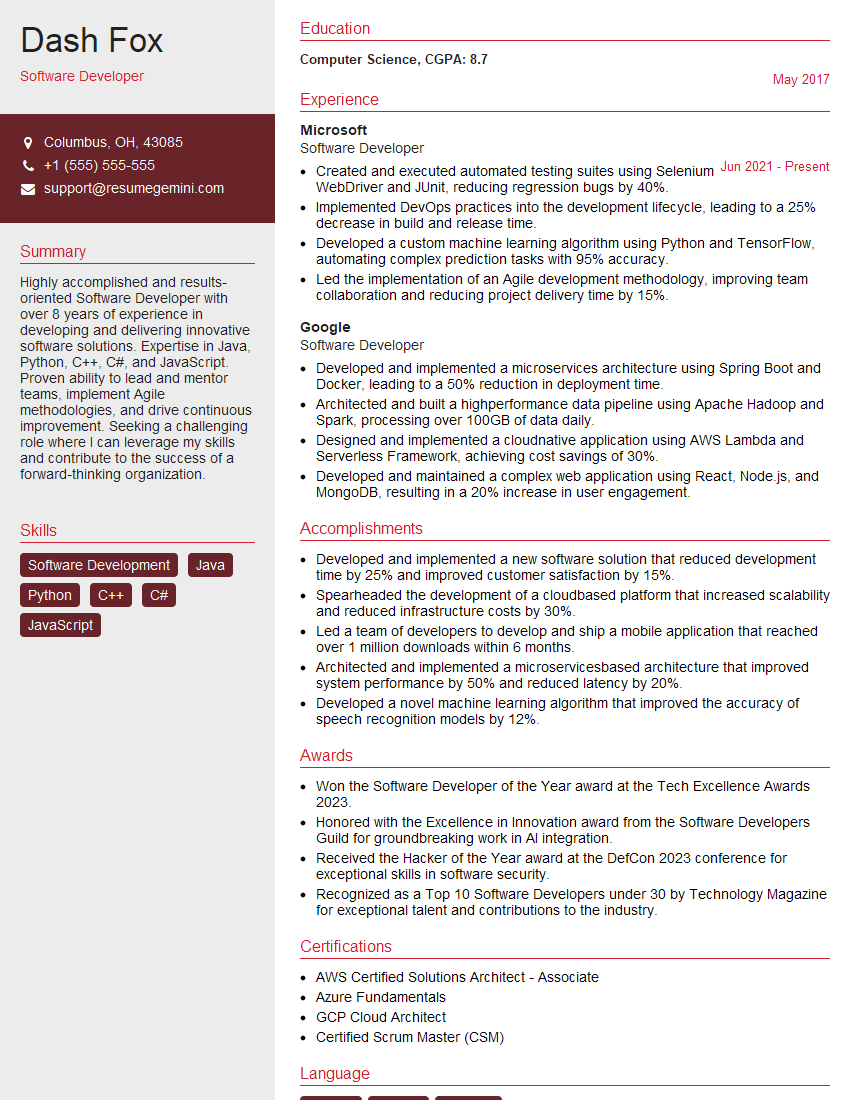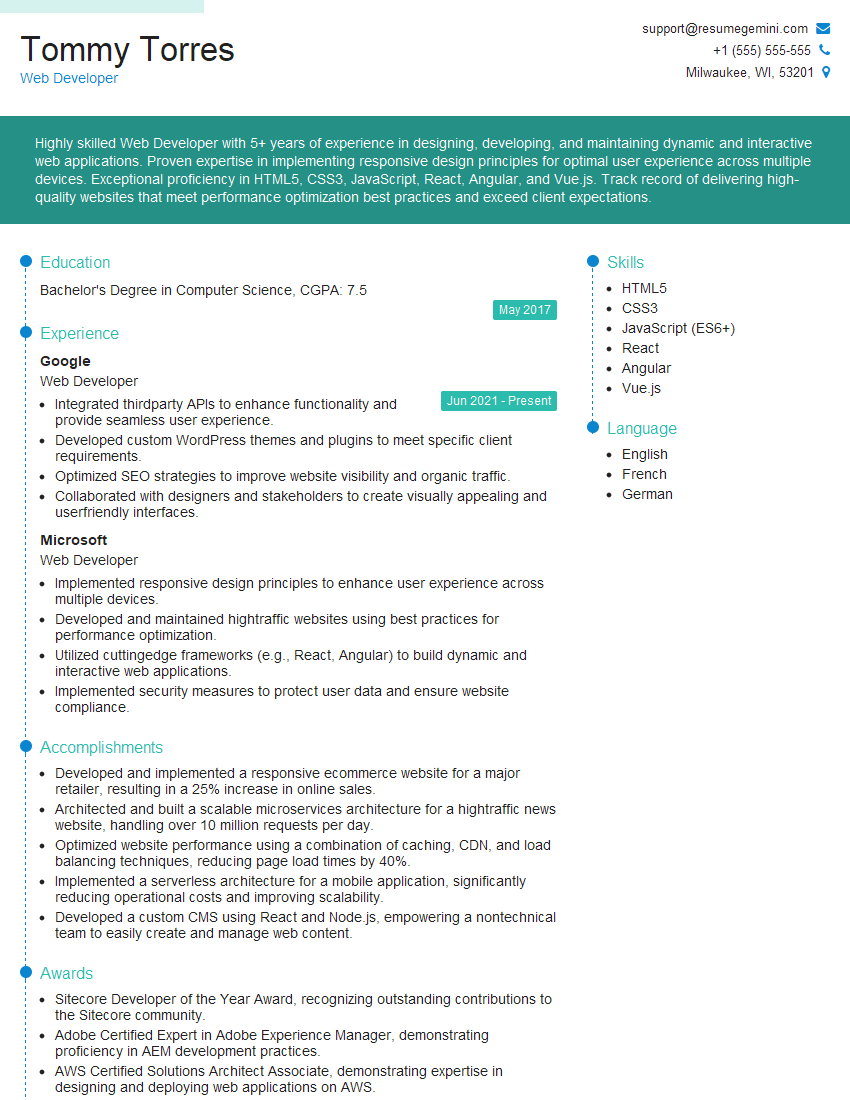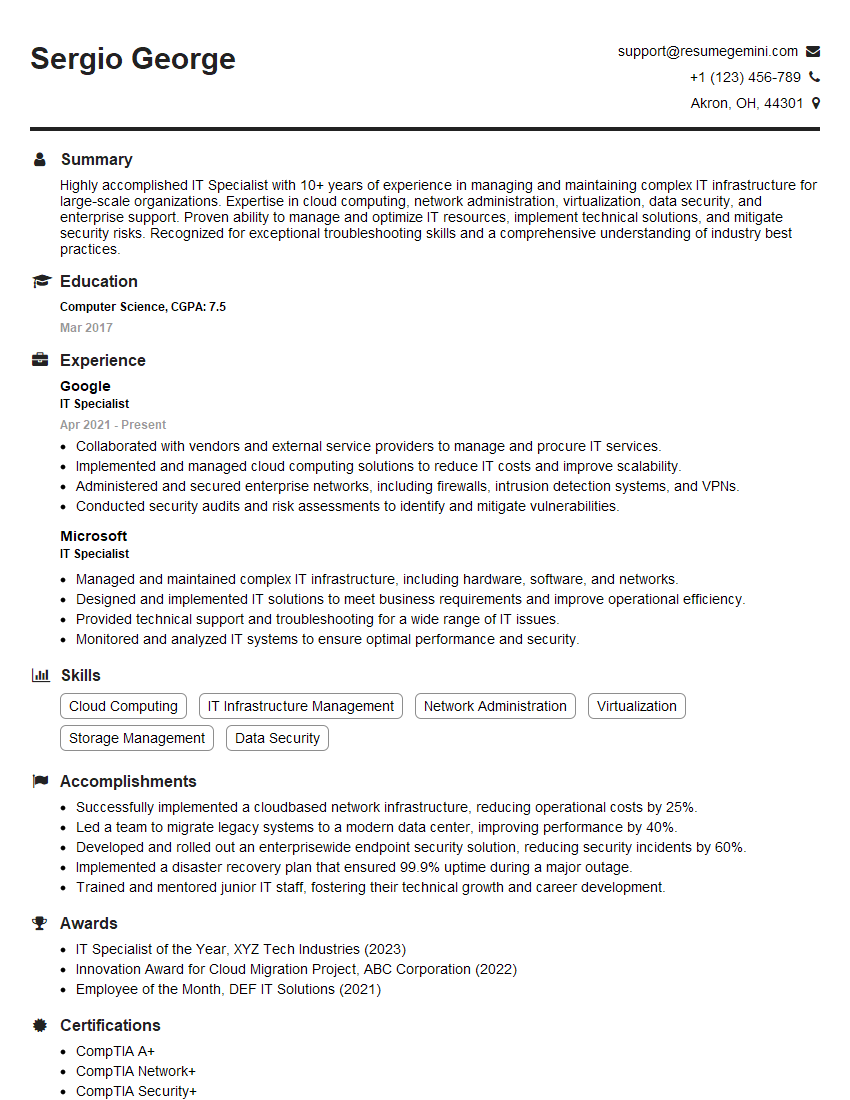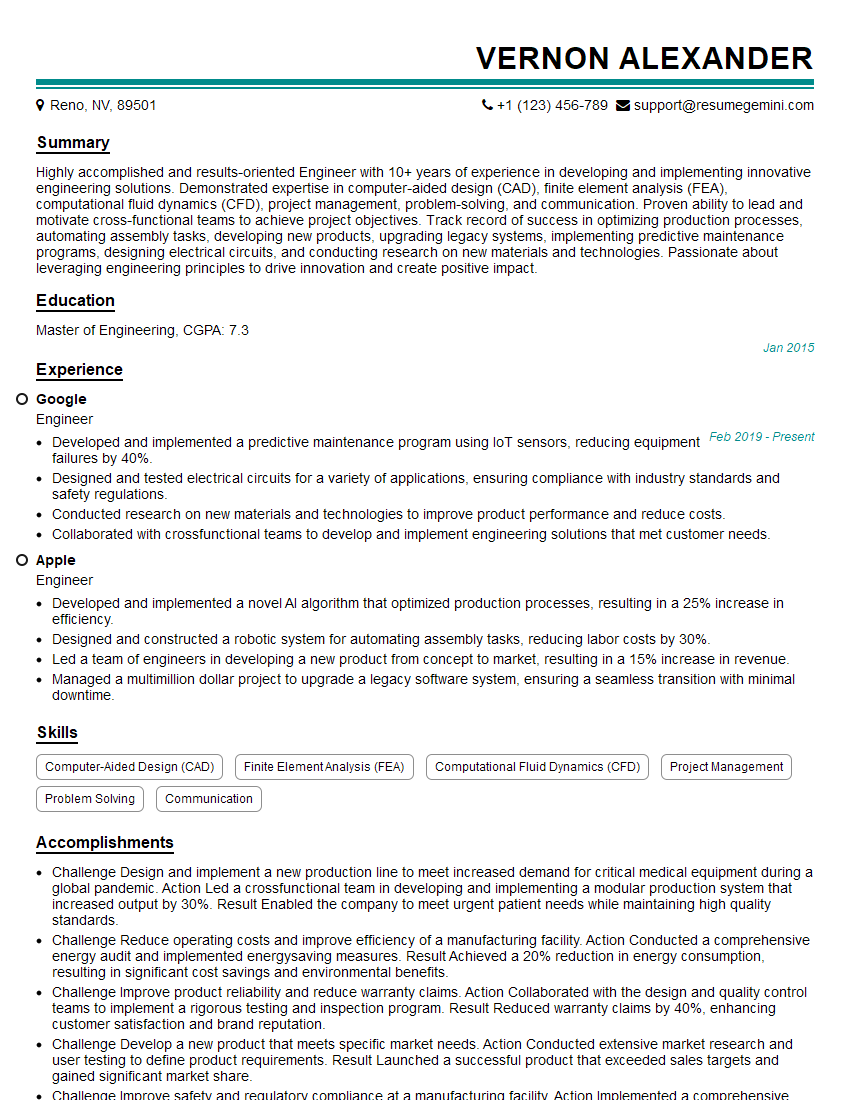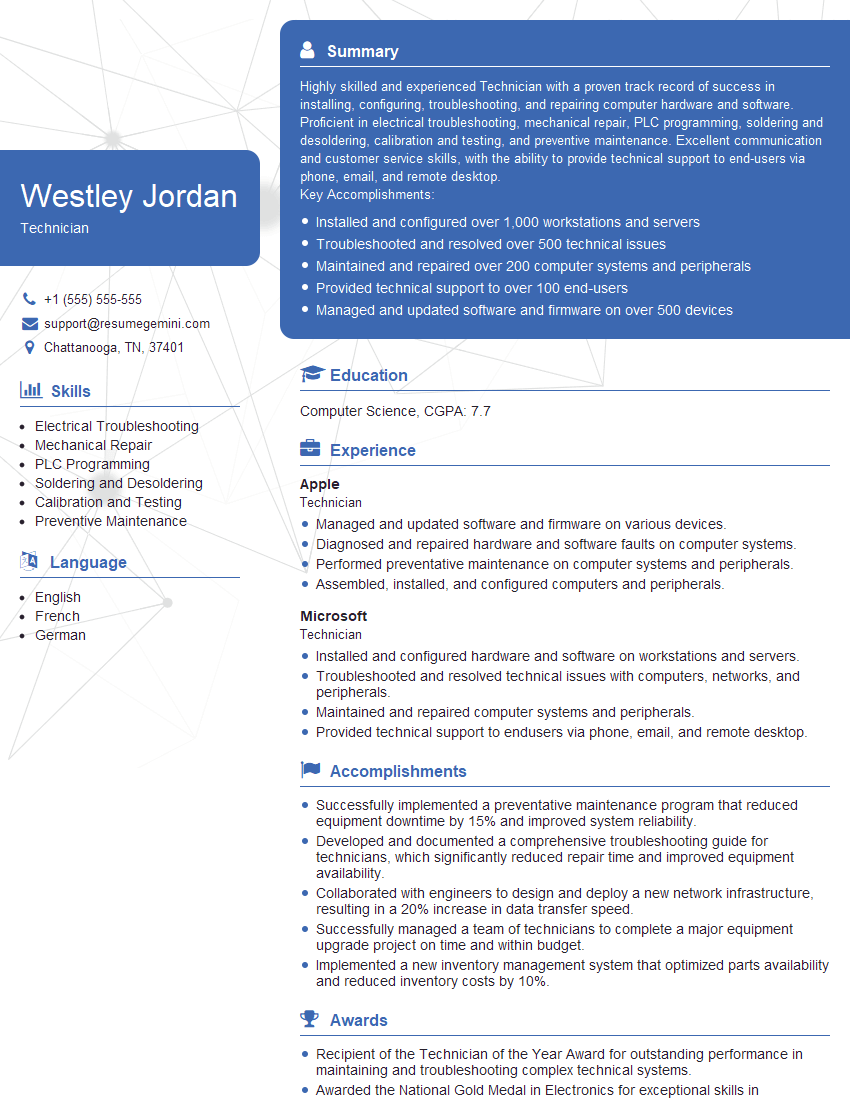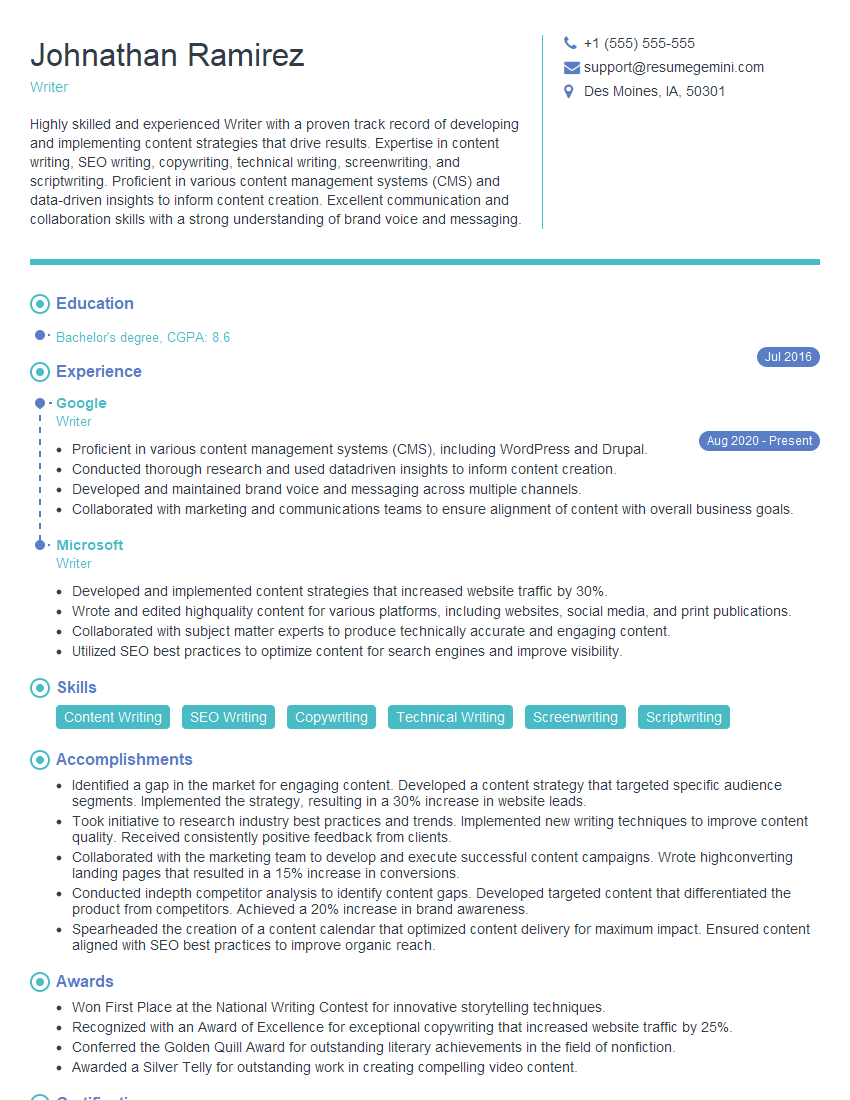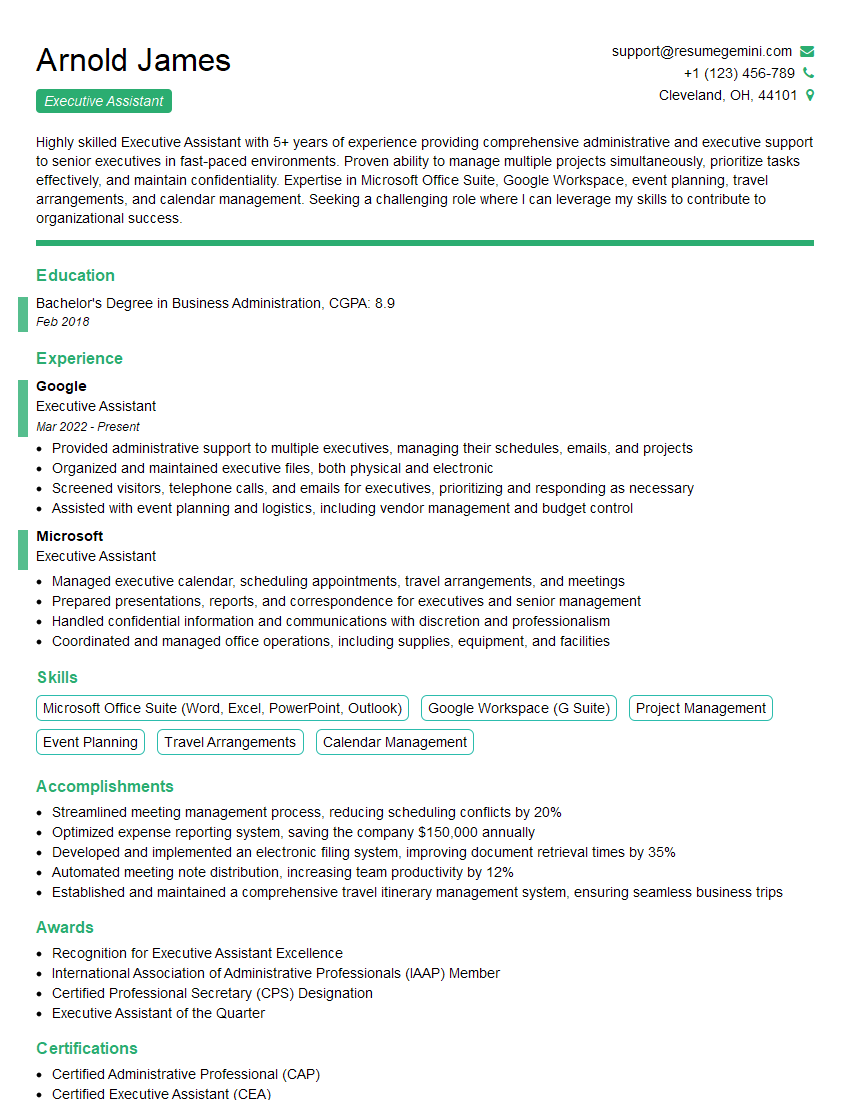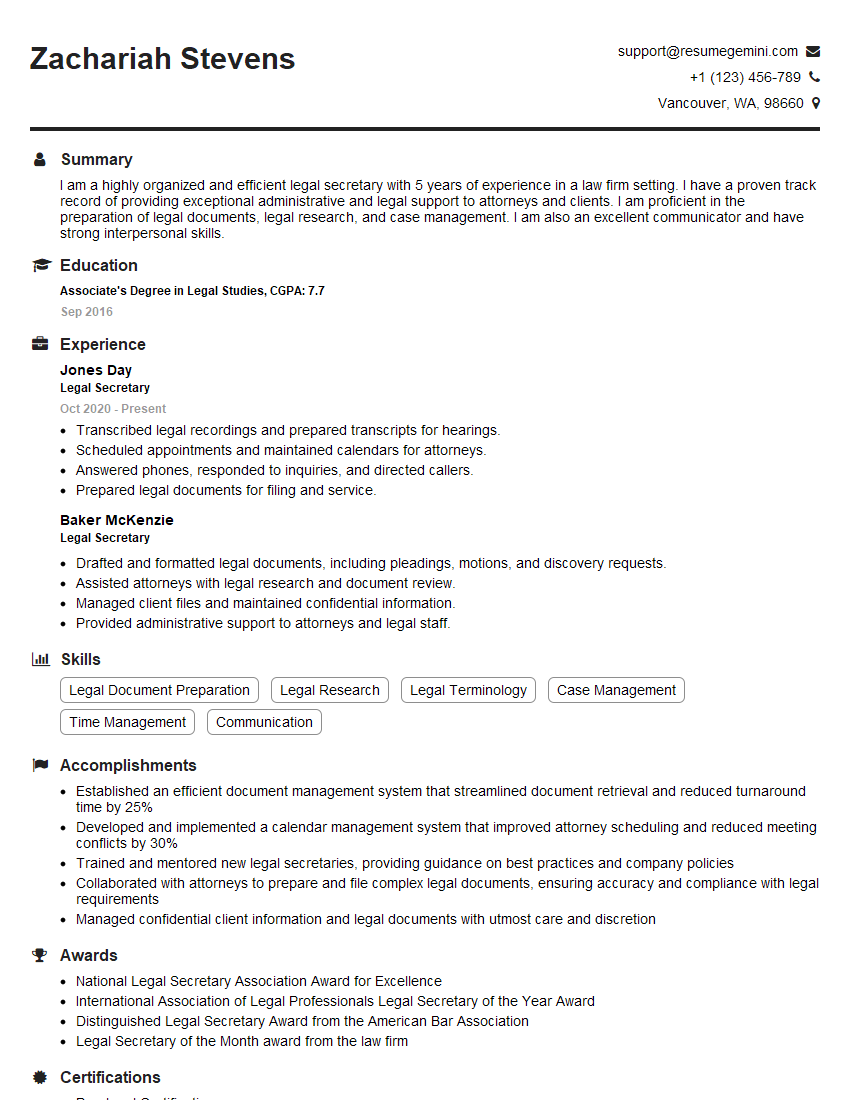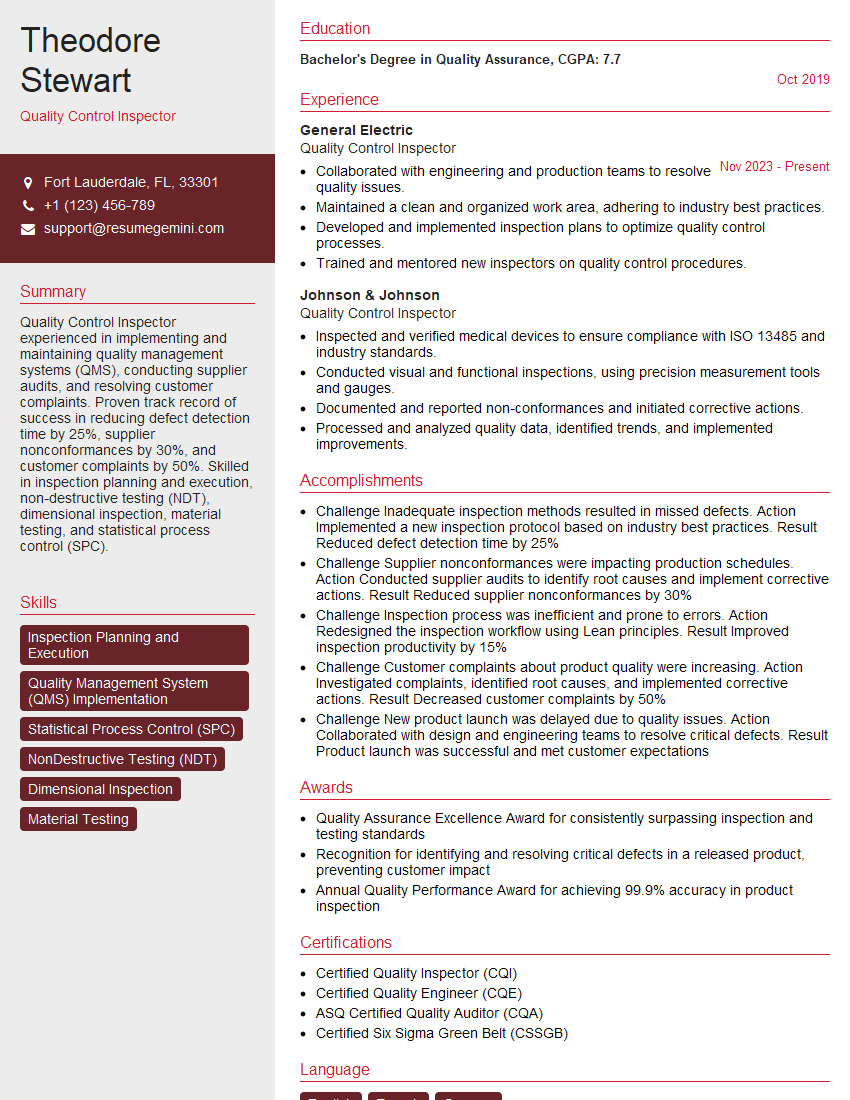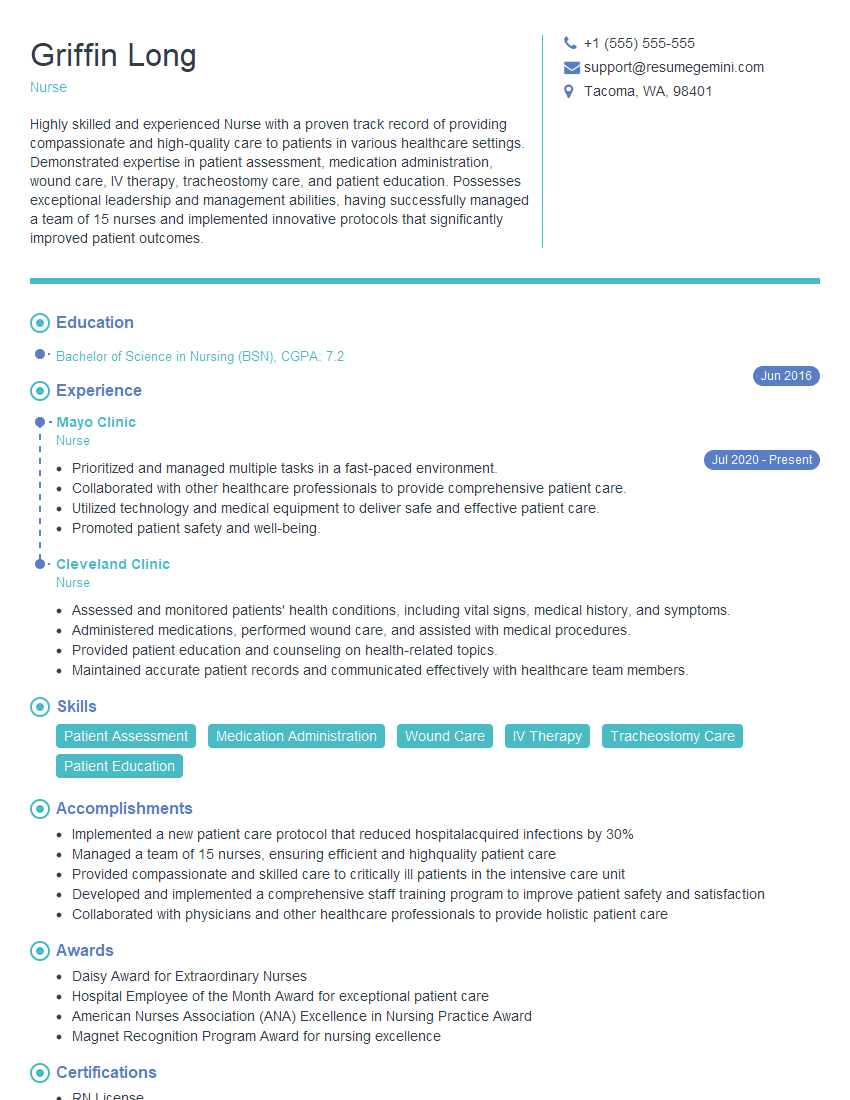Are you ready to stand out in your next interview? Understanding and preparing for Demonstrating Strong Work Ethic and Integrity interview questions is a game-changer. In this blog, we’ve compiled key questions and expert advice to help you showcase your skills with confidence and precision. Let’s get started on your journey to acing the interview.
Questions Asked in Demonstrating Strong Work Ethic and Integrity Interview
Q 1. Describe a time you had to meet a tight deadline. What strategies did you use?
Meeting tight deadlines requires a proactive and organized approach. It’s not just about working harder, but working smarter. In one instance, I was tasked with completing a critical report for a major client, due in just three days. This was significantly shorter than the typical timeline.
Prioritization: I immediately broke down the report into smaller, manageable tasks, prioritizing the most critical sections first. I used a Kanban board (a visual task management system) to track my progress.
Time Blocking: I allocated specific time slots for each task, ensuring realistic time estimates. This prevented me from getting bogged down in less important details. I also scheduled short breaks to avoid burnout.
Resource Allocation: I identified any potential roadblocks early on and proactively sought assistance where needed. This included collaborating with colleagues to gather the necessary data efficiently.
Communication: I kept my manager updated on my progress, highlighting any challenges I encountered. Open communication ensured alignment and prevented unexpected delays.
Through this structured approach, I successfully delivered the report on time and to the client’s satisfaction. The key was not just speed but also maintaining quality, ensuring accuracy and completeness even under pressure.
Q 2. How do you prioritize tasks when faced with multiple competing demands?
Prioritizing tasks effectively is crucial for maximizing productivity. I utilize a combination of methods, depending on the complexity of the situation. Think of it like managing a construction project: you wouldn’t build the roof before the foundation!
Eisenhower Matrix (Urgent/Important): I categorize tasks based on urgency and importance. Urgent and important tasks get immediate attention, while less urgent/important tasks are delegated or scheduled for later. This helps to avoid getting overwhelmed by less critical items.
Prioritization Matrix: Another method is using a simple prioritization matrix that evaluates tasks by impact and effort. High-impact, low-effort tasks should be tackled first for maximum efficiency.
Time Sensitivity: Deadlines play a crucial role. Tasks with the closest deadlines often get precedence, but only after evaluating their importance within the larger context.
By consistently employing these strategies, I ensure that my time and energy are focused on the most valuable tasks, leading to improved efficiency and results.
Q 3. Have you ever had to work with someone who lacked a strong work ethic? How did you handle it?
Working with individuals who lack a strong work ethic can be challenging, but it’s important to handle the situation professionally and constructively. In one situation, a team member consistently missed deadlines and delivered subpar work.
Direct and Private Communication: I first approached the individual privately to understand the underlying reasons for their performance issues. Perhaps there were obstacles I could help address.
Focus on Solutions: Instead of focusing on blame, I aimed to offer support and guidance. This included suggesting time management strategies or offering assistance with specific tasks.
Documentation: I carefully documented all instances of missed deadlines and subpar work, providing concrete evidence for any formal action that might be necessary. This protects both myself and the company.
Escalation (If Necessary): When informal approaches failed, I escalated the issue to my manager. It’s crucial to involve management when efforts to address the issue directly have proven unsuccessful.
My approach was always about finding a solution that was beneficial to both the individual and the team. While maintaining a professional demeanor, I didn’t hesitate to address the issue when it impacted team performance. The goal is not to create conflict, but to encourage improvement and maintain a productive work environment.
Q 4. Describe a situation where you had to make a difficult decision that involved ethical considerations.
Ethical dilemmas can arise unexpectedly in any workplace. Once, I faced a situation where I discovered a potential data privacy violation within our system. A colleague unintentionally exposed sensitive client information while troubleshooting a technical issue.
Identify the Issue: The first step was clearly identifying the ethical breach: exposure of confidential client data violated our company’s policies and potentially legal regulations.
Assess the Impact: I assessed the potential impact of the breach, considering the severity of the exposed information and the number of clients affected.
Consider Options: I considered several options, including informing my manager immediately, taking the initiative to rectify the data breach, or speaking to my colleague to understand the root cause and prevent future incidents.
Choose the Ethical Course of Action: I decided to immediately inform my manager, documenting the incident with detail. Transparency and adherence to company policy were paramount.
Following the established protocol ensured that the issue was addressed swiftly and appropriately, minimizing potential damage and upholding the company’s ethical standards. Transparency and reporting were key to mitigating the situation effectively.
Q 5. How do you ensure accuracy and thoroughness in your work?
Accuracy and thoroughness are paramount to producing high-quality work. My approach involves several key strategies.
Double-Checking: I always double-check my work, meticulously reviewing every detail to identify any errors or omissions. This might involve using different methods to verify results or asking a colleague for a fresh perspective.
Utilizing Checklists: Checklists help ensure that all steps in a process are followed consistently. This is particularly important for repetitive tasks or complex projects.
Seeking Feedback: I actively seek feedback from colleagues or supervisors to identify potential areas for improvement or to gain insights that I might have missed.
Understanding the Requirements: I always start by thoroughly understanding the project requirements before I begin any task. This clarity helps to avoid errors that stem from misinterpretations.
This multi-faceted approach minimizes errors, ensuring that the final product is of the highest possible quality and reflects a commitment to excellence.
Q 6. Give an example of a time you identified a problem at work and took initiative to solve it.
Proactive problem-solving is crucial for a productive workplace. In one instance, I noticed a recurring issue with our project management software that was impacting team efficiency. Tasks were often duplicated, deadlines were missed and progress tracking was inaccurate.
Problem Identification: I clearly identified the issue: the software lacked a robust system for task assignment and progress tracking, leading to inconsistencies and inefficiencies.
Analysis: I analyzed the problem, noting the frequency of errors and the impact on project timelines and team morale.
Solution Proposal: I proposed a solution: implementing a new system of color-coded labels and a more streamlined task management process to resolve the problem of duplicate tasks and improve task tracking.
Implementation: I presented my proposal to my manager, who approved the plan. I then trained my team on the new system and monitored its effectiveness.
By taking initiative, I not only improved team efficiency but also demonstrated my commitment to continuous improvement and problem-solving.
Q 7. How do you handle constructive criticism?
Constructive criticism is invaluable for professional growth. I view it as an opportunity to learn and improve. My approach involves several key steps.
Active Listening: I actively listen to the feedback, asking clarifying questions to ensure I fully understand the points being made.
Reflect and Analyze: After receiving feedback, I take time to reflect on the points and analyze their validity. I consider how the suggestions can improve my performance.
Implement Changes: I strive to implement the suggested changes, making concrete adjustments to my approach as appropriate.
Express Gratitude: I express my appreciation for the feedback, recognizing that it is provided to help me improve. A positive attitude shows that I value their input.
By embracing constructive criticism as a tool for growth, I continue to refine my skills and become a more effective professional. This demonstrates a willingness to learn and adapt, key qualities in any successful career.
Q 8. How do you manage your time effectively?
Effective time management is crucial for productivity and minimizing stress. My approach involves a combination of planning, prioritization, and execution. I begin by creating a prioritized to-do list, breaking down large tasks into smaller, manageable steps. I utilize tools like calendars and task management apps to schedule appointments and deadlines, ensuring I allocate sufficient time for each task. I also employ the Pomodoro Technique – working in focused bursts with short breaks – to maintain concentration and prevent burnout. Regularly reviewing and adjusting my schedule ensures I stay on track and adapt to changing priorities. For example, during a particularly busy project involving multiple deadlines, I color-coded my calendar to visually represent different project phases, ensuring I could quickly assess potential conflicts and allocate time effectively.
Q 9. How do you maintain your motivation and energy levels throughout the workday?
Maintaining motivation and energy throughout the workday requires a holistic approach. Firstly, I ensure I get adequate sleep and maintain a healthy diet, as these are fundamental to sustained energy levels. Secondly, I prioritize physical activity, even short breaks for stretching or a quick walk, to boost circulation and clear my head. Thirdly, I actively seek out engaging tasks and celebrate small victories to maintain enthusiasm. Finally, I practice mindfulness techniques like deep breathing to manage stress and improve focus. For instance, if I find myself feeling drained during a long project, I might take a short break to listen to upbeat music or engage in a brief meditation session to refocus and recharge. This helps me maintain a positive attitude and prevents burnout.
Q 10. What steps do you take to ensure the quality of your work?
Ensuring the quality of my work involves a multi-stage process. Firstly, I meticulously review all instructions and requirements before commencing a task to ensure complete understanding. Secondly, I utilize a methodical approach, focusing on accuracy and precision at each stage. Thirdly, I implement rigorous self-checking mechanisms, involving proofreading, double-checking calculations, and testing the final output before submission. Finally, I actively seek feedback from colleagues or supervisors, using their input to refine my work and identify any potential areas for improvement. For example, when preparing a critical report, I would not only proofread it myself but also ask a colleague to review it for clarity and accuracy. This collaborative approach helps identify errors that might have been overlooked during individual review.
Q 11. Describe a time you had to work independently on a complex project.
In my previous role, I was tasked with independently developing a new software module from scratch. This involved extensive research, coding, testing, and documentation. The project was challenging due to its complexity and tight deadline. I tackled this by breaking down the project into smaller, manageable tasks, creating a detailed project plan with specific milestones and deadlines. I meticulously documented each stage of the development process, enabling me to track progress and identify any potential roadblocks early on. Regular self-assessment against the project plan allowed me to adjust my approach as needed, ultimately delivering the module on time and within budget. This experience significantly enhanced my independent problem-solving and project management skills.
Q 12. How do you handle setbacks and challenges?
Setbacks and challenges are inevitable in any professional environment. My approach involves maintaining a positive attitude, focusing on solutions rather than dwelling on problems. I start by identifying the root cause of the setback, gathering relevant information, and analyzing potential solutions. I then develop a plan of action, prioritizing tasks based on their impact and feasibility. Throughout the process, I actively seek support from colleagues or supervisors if needed, leveraging their expertise to overcome challenges. For example, when faced with a critical bug in a software program, I systematically debugged the code, consulting online resources and leveraging the knowledge of senior developers to isolate and fix the issue. This process emphasized my resilience and problem-solving abilities.
Q 13. How do you maintain confidentiality in your work?
Maintaining confidentiality is paramount in my work. I strictly adhere to company policies and procedures regarding data security and information sharing. I only access information relevant to my duties and avoid discussing sensitive information in informal settings or with unauthorized individuals. I utilize secure communication channels and password-protect sensitive documents. Furthermore, I am always mindful of my surroundings when discussing work-related matters, avoiding public spaces or situations where conversations could be overheard. In essence, I treat confidentiality as a critical responsibility and act accordingly in every aspect of my professional life.
Q 14. Have you ever witnessed unethical behavior in the workplace? How did you respond?
In a previous role, I witnessed a colleague falsifying data in a report. This violated company policy and compromised the integrity of our work. My initial response was to address the issue internally, speaking privately to the colleague to explain the seriousness of their actions and the potential repercussions. When the behavior continued, I reported the incident to my supervisor, adhering to the company’s ethical reporting procedures. This situation highlighted the importance of acting ethically and reporting wrongdoing, even if it means addressing difficult situations.
Q 15. How do you handle pressure and stressful situations?
Pressure and stressful situations are inevitable in any professional environment. My approach involves a combination of proactive strategies and reactive responses. Proactively, I prioritize time management and effective planning, breaking down large tasks into smaller, manageable steps. This prevents feeling overwhelmed and allows for a more controlled approach. I also focus on maintaining a healthy work-life balance, ensuring adequate rest, exercise, and relaxation to build resilience. Reactively, when faced with a stressful situation, I take a moment to assess the situation calmly, identifying the key issues and potential solutions. I find it helpful to prioritize tasks based on urgency and importance using methods like the Eisenhower Matrix (urgent/important). I also believe in seeking support from colleagues or mentors when necessary – collaboration is key to overcoming challenges. For example, during a project deadline crunch, I once proactively delegated certain tasks to team members based on their strengths, ensuring a smoother workflow and preventing burnout. This not only helped meet the deadline but also strengthened team collaboration.
Career Expert Tips:
- Ace those interviews! Prepare effectively by reviewing the Top 50 Most Common Interview Questions on ResumeGemini.
- Navigate your job search with confidence! Explore a wide range of Career Tips on ResumeGemini. Learn about common challenges and recommendations to overcome them.
- Craft the perfect resume! Master the Art of Resume Writing with ResumeGemini’s guide. Showcase your unique qualifications and achievements effectively.
- Don’t miss out on holiday savings! Build your dream resume with ResumeGemini’s ATS optimized templates.
Q 16. Describe a situation where you had to make a difficult ethical decision.
In a previous role, I encountered a situation where a senior colleague inadvertently shared confidential client information with a competitor. This violated our company’s strict confidentiality policies and posed a significant ethical dilemma. My first step was to privately discuss my concerns with the colleague, emphasizing the severity of the breach and the potential consequences. I explained that while their intentions were likely innocent, the action had serious implications. Since the situation was not resolved through direct conversation, I escalated the issue to my manager, following established company protocol. While challenging, I prioritized integrity and adherence to company policies, understanding that protecting client information is paramount. The subsequent investigation and corrective actions reinforced the importance of ethical decision-making in a professional setting. My action demonstrates commitment to ethical principles, even when dealing with uncomfortable situations.
Q 17. What are your personal values, and how do they inform your work ethic?
My core personal values are integrity, accountability, and continuous learning. These values directly influence my work ethic. Integrity guides me to act honestly and ethically in all my interactions, building trust with colleagues and clients. Accountability means I take ownership of my work and actions, readily admitting mistakes and striving for continuous improvement. Continuous learning reflects my commitment to expanding my knowledge and skills, ensuring I remain a valuable asset to any team. For example, my commitment to accountability manifested during a project where I missed a critical deadline due to a miscalculation. I immediately owned up to my mistake, communicated transparently with my team and manager, and developed a plan to rectify the situation. This proactive approach not only mitigated the negative impact but also demonstrated my commitment to accountability and responsibility.
Q 18. How do you balance your work and personal life?
Maintaining a healthy work-life balance is crucial for both professional success and personal well-being. I approach this by setting clear boundaries between work and personal time. This includes defining specific working hours, avoiding checking work emails outside of those hours as much as possible, and prioritizing time for activities outside of work. I also schedule personal appointments and commitments as if they were important work meetings, ensuring they remain a priority. Regular breaks throughout the workday are essential, allowing for physical and mental rejuvenation. Finally, I make sure to engage in activities that help me relax and recharge, such as spending time with loved ones, exercising, or pursuing hobbies. The key is consistency and intentionality in making time for both aspects of life.
Q 19. Describe a time you went above and beyond your job description.
During a particularly demanding project, our team was facing a significant technical challenge that was delaying the project’s launch. While my role didn’t directly involve resolving this specific technical issue, I recognized the criticality of the situation. I volunteered to assist by researching potential solutions, coordinating communication between the technical team and other stakeholders, and providing support for the team facing the issue. This meant working extra hours, learning a new technology, and going beyond my stated responsibilities. While this was demanding, successfully navigating the challenge strengthened my knowledge and significantly contributed to the project’s successful and timely completion. It showcased my commitment to team success and problem-solving beyond the scope of my job description.
Q 20. How do you adapt to changes in the workplace?
Adaptability is a vital skill in today’s dynamic workplace. My approach involves maintaining a positive attitude and embracing change as an opportunity for growth. I actively seek to understand the rationale behind changes and collaborate with my team to find efficient ways to implement them. I leverage tools and resources to quickly learn new processes and technologies. I actively participate in training sessions and workshops to improve my proficiency. For example, when our company transitioned to a new project management software, I proactively enrolled in online training courses and sought mentorship from colleagues to become proficient. My quick adaptation ensured a smooth transition and demonstrated my commitment to continuous professional development.
Q 21. How do you stay current in your field?
Staying current in my field requires a multi-faceted approach. I actively participate in industry conferences, workshops, and webinars to learn about the latest trends and technologies. I subscribe to relevant industry publications and journals to remain informed about breakthroughs and developments. I also actively engage in professional networking, connecting with colleagues and peers through online platforms and professional organizations. Furthermore, I dedicate time to independent research and learning, utilizing online resources and engaging in continuous learning platforms. Continuous learning and staying updated with industry trends is not just a personal endeavor but a professional necessity.
Q 22. How do you build and maintain positive working relationships?
Building and maintaining positive working relationships is crucial for a productive and enjoyable work environment. It’s about fostering mutual respect, trust, and open communication. I approach this by actively listening to colleagues, valuing diverse perspectives, and offering support whenever possible. I believe in proactive communication; addressing concerns promptly and directly, rather than letting issues fester.
- Active Listening: I make a conscious effort to truly understand others’ viewpoints, asking clarifying questions and summarizing their points to ensure comprehension.
- Collaboration: I actively participate in team projects, sharing my expertise and readily assisting teammates. I also celebrate team successes, reinforcing a sense of shared accomplishment.
- Respectful Communication: I communicate clearly and respectfully, even when disagreeing. I choose my words carefully and maintain a professional demeanor, even under pressure.
- Conflict Resolution: I address conflicts promptly and fairly, focusing on finding solutions that benefit all parties involved. I see conflict as an opportunity for growth and improvement.
For example, in a previous role, I noticed a team member struggling with a new software. Instead of simply offering a solution, I spent time explaining the concepts in a way that resonated with their learning style. This fostered trust and a stronger working relationship.
Q 23. Describe a time you had to compromise to reach a solution.
Compromise is essential for effective teamwork. It’s about finding mutually acceptable solutions, even when initial positions differ. A recent example involves a project where the design team preferred a visually striking but technically complex solution, while the development team favored a simpler, less visually appealing approach due to time constraints.
To reach a solution, we engaged in open discussions, outlining the pros and cons of each approach. We considered factors like project deadlines, budget limitations, and user experience. Eventually, we compromised by adopting a hybrid approach: implementing the core functionality with the simpler design, and incorporating visually striking elements in a phased rollout. This allowed us to meet the deadlines while still achieving a visually appealing final product. This taught me the importance of understanding different perspectives and creatively finding common ground.
Q 24. How do you identify and address potential conflicts of interest?
Conflicts of interest arise when personal interests could potentially compromise professional judgment or objectivity. Identifying them requires self-awareness and proactive scrutiny. My approach involves:
- Transparency: I disclose any potential conflicts, no matter how minor, to my supervisor or relevant parties. This allows for open discussion and the implementation of appropriate mitigation strategies.
- Objectivity: I strive to maintain objectivity in all my decisions, avoiding situations where personal biases might influence professional judgment. If I sense a potential conflict, I actively seek advice to ensure impartiality.
- Recusal: If a conflict cannot be effectively mitigated, I will recuse myself from the decision-making process to avoid any appearance of impropriety.
For example, if I were evaluating a vendor for a project and had a prior relationship with one of the bidding companies, I would disclose this relationship immediately. This ensures transparency and allows for a fair and unbiased evaluation process.
Q 25. What is your approach to problem-solving?
My problem-solving approach is systematic and data-driven. I follow a structured process:
- Define the problem: Clearly articulate the problem, gathering all relevant information. This often involves asking clarifying questions and analyzing available data.
- Identify potential solutions: Brainstorm a range of potential solutions, considering different perspectives and approaches. I find mind-mapping or SWOT analysis helpful in this stage.
- Evaluate solutions: Assess each potential solution based on feasibility, cost-effectiveness, and potential impact. This might involve gathering data, running simulations, or consulting with experts.
- Implement the chosen solution: Carefully implement the selected solution, monitoring progress and making adjustments as needed. Documentation is key here.
- Evaluate results: Once implemented, I evaluate the effectiveness of the solution, documenting both successes and areas for improvement. This informs future problem-solving efforts.
I am comfortable using various problem-solving frameworks, such as the 5 Whys to identify root causes, or the Pareto principle to focus on the most impactful solutions.
Q 26. Describe a time you made a mistake. What did you learn from it?
In a previous project, I underestimated the time required for a crucial phase, leading to a slight delay in the overall project timeline. This resulted in some extra pressure on the team.
From this experience, I learned the importance of thorough planning and realistic time estimations. I now employ more rigorous project management techniques, including detailed task breakdowns and contingency planning. I also actively seek input from team members to ensure more accurate estimations. Moreover, I’ve improved my communication skills; reporting progress transparently and proactively addressing potential challenges.
Q 27. How do you demonstrate accountability for your actions?
Accountability means taking ownership of my actions and their consequences. I demonstrate this by:
- Owning my mistakes: I readily acknowledge my errors and take responsibility for rectifying them. This includes learning from the mistakes and implementing measures to prevent similar occurrences.
- Meeting commitments: I consistently meet deadlines and fulfill my obligations, prioritizing tasks effectively and communicating any potential delays proactively.
- Seeking feedback: I actively solicit feedback on my performance and use it to improve my skills and approach.
- Following through: I ensure tasks are completed to the highest standard and follow up on actions as needed to ensure projects are successfully completed.
For example, if a project falls behind schedule due to a decision I made, I will take responsibility, propose corrective actions, and work diligently to get the project back on track. I won’t make excuses; I will focus on solutions.
Q 28. Explain your understanding of professional ethics.
Professional ethics are a set of moral principles that guide professional conduct. They dictate how we should behave in our professional roles, ensuring fairness, honesty, and integrity. Key aspects include:
- Integrity: Maintaining honesty and trustworthiness in all interactions, avoiding conflicts of interest and upholding ethical standards even when difficult.
- Confidentiality: Protecting sensitive information and respecting the privacy of colleagues and clients.
- Objectivity: Making decisions based on facts and evidence, free from bias or personal interest.
- Accountability: Taking responsibility for one’s actions and decisions, and being transparent in professional dealings.
- Respect: Treating colleagues, clients, and stakeholders with respect, valuing diverse perspectives and maintaining a professional demeanor.
Adherence to professional ethics builds trust and fosters positive relationships, contributing significantly to a successful and ethical career. My commitment to these principles guides my actions daily.
Key Topics to Learn for Demonstrating Strong Work Ethic and Integrity in Interviews
- Understanding Work Ethic: Defining what constitutes a strong work ethic in your field, including dedication, perseverance, and a proactive approach to challenges. Consider how your past experiences reflect these qualities.
- Practical Application of Work Ethic: Sharing specific examples from previous roles where you demonstrated initiative, exceeded expectations, or overcame obstacles through consistent effort. Quantify your achievements whenever possible.
- Integrity in the Workplace: Exploring the concept of professional integrity, including honesty, accountability, confidentiality, and ethical decision-making. Prepare examples showcasing your commitment to these principles.
- Problem-Solving with Integrity: Highlighting situations where you faced ethical dilemmas or challenging situations requiring integrity. Explain how you navigated these scenarios, emphasizing your decision-making process and adherence to ethical standards.
- Teamwork and Collaboration: Demonstrating how your work ethic and integrity contribute to effective teamwork. Share examples where you collaborated effectively while maintaining ethical conduct.
- Adaptability and Resilience: Showcasing your ability to adapt to changing circumstances and overcome setbacks while maintaining a strong work ethic and unwavering integrity. Focus on your perseverance and positive attitude.
- Continuous Learning and Improvement: Illustrating your commitment to professional development and your proactive approach to learning new skills and knowledge to enhance your performance and maintain high ethical standards.
Next Steps
Mastering the art of demonstrating a strong work ethic and unwavering integrity is crucial for career advancement. It builds trust with employers and showcases your reliability and commitment to excellence. To significantly boost your job prospects, focus on crafting an ATS-friendly resume that effectively highlights these vital qualities. ResumeGemini is a trusted resource to help you build a professional and impactful resume that catches the eye of recruiters. We provide examples of resumes tailored to effectively showcase a strong work ethic and integrity; review them for inspiration and guidance as you build your own compelling application materials.
Explore more articles
Users Rating of Our Blogs
Share Your Experience
We value your feedback! Please rate our content and share your thoughts (optional).
What Readers Say About Our Blog
Hi, I’m Jay, we have a few potential clients that are interested in your services, thought you might be a good fit. I’d love to talk about the details, when do you have time to talk?
Best,
Jay
Founder | CEO
